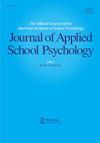More than Just a Game: A Guide to Using Randomized Group Contingencies in Schools
IF 1.5
Q4 PSYCHOLOGY, EDUCATIONAL
引用次数: 0
Abstract
Abstract Group contingencies are evidence-based behavioral interventions frequently employed in educational settings. Group contingencies are composed of four distinct parameters: (1) a criterion, (2) a reward, (3) target students, and (4) target behaviors. Although it is common practice for teachers to reveal these parameters to students before the intervention begins (i.e. a traditional group contingency), doing so may threaten intervention effectiveness, acceptability and feasibility. One approach that has emerged in the literature to protect against these threats is randomizing group contingencies. In randomized group contingencies, some or all parameters of the group contingency are undisclosed to students to safeguard against the aforementioned threats. Given the need for maximally effective, empirically supported behavioral interventions in schools, a practical guide to using randomized group contingencies in classrooms could be useful to educators. Thus, the goal of this paper is threefold: (a) to identify drawbacks of traditional group contingencies that threaten to adversely impact their effectiveness and acceptability in schools, (b) to describe how randomized group contingencies can protect against those threats, and (c) to outline practical advantages of using randomized group contingencies in schools.《不只是游戏:在学校中使用随机群体偶然性指南
摘要群体突发事件是教育环境中经常采用的循证行为干预措施。群体偶然性由四个不同的参数组成:(1)标准,(2)奖励,(3)目标学生,(4)目标行为。尽管教师在干预开始前向学生透露这些参数是常见的做法(即传统的群体偶然性),但这样做可能会威胁干预的有效性、可接受性和可行性。文献中出现的一种防范这些威胁的方法是随机化群体突发事件。在随机的群体偶然性中,群体偶然性的部分或全部参数不对学生公开,以防范上述威胁。考虑到学校需要最大限度地有效、经验支持的行为干预,在课堂上使用随机群体突发事件的实用指南可能对教育工作者有用。因此,本文的目标有三个:(a)确定传统群体意外事件的缺点,这些缺点可能会对其在学校的有效性和可接受性产生不利影响;(b)描述随机群体意外事件如何抵御这些威胁;(c)概述在学校中使用随机群体意外情况的实际优势。
本文章由计算机程序翻译,如有差异,请以英文原文为准。
求助全文
约1分钟内获得全文
求助全文
来源期刊

Journal of Applied School Psychology
PSYCHOLOGY, EDUCATIONAL-
CiteScore
2.40
自引率
10.00%
发文量
7
期刊介绍:
With a new publisher (Taylor & Francis) and a new editor (David L. Wodrich), the Journal of Applied School Psychology will continue to publish articles and periodic thematic issues in 2009. Each submission should rest on either solid theoretical or empirical support and provide information that can be used in applied school settings, related educational systems, or community locations in which practitioners work. Manuscripts appropriate for publication in the journal will reflect psychological applications that pertain to individual students, groups of students, teachers, parents, and administrators. The journal also seeks, over time, novel and creative ways in which to disseminate information about practically sound and empirically supported school psychology practice.
 求助内容:
求助内容: 应助结果提醒方式:
应助结果提醒方式:


